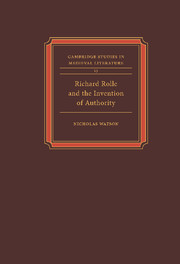Book contents
- Frontmatter
- Contents
- Preface
- List of abbreviations
- Introduction: Contexts: three preliminary essays
- PART I
- PART II
- 3 Active life: Judica Me as apologetic pastoral
- 4 Contemplative life, ‘Seeing into Heaven’: commentaries and Canticum Amoris
- PART III
- PART IV
- Epilogue: Rolle as a late medieval Auctor
- Excursus I: The chronology of Rolle's writings
- Excursus II: Rolle's reading and the reliability of the Officium
- Notes
- Bibliography
- Index
4 - Contemplative life, ‘Seeing into Heaven’: commentaries and Canticum Amoris
Published online by Cambridge University Press: 04 December 2009
- Frontmatter
- Contents
- Preface
- List of abbreviations
- Introduction: Contexts: three preliminary essays
- PART I
- PART II
- 3 Active life: Judica Me as apologetic pastoral
- 4 Contemplative life, ‘Seeing into Heaven’: commentaries and Canticum Amoris
- PART III
- PART IV
- Epilogue: Rolle as a late medieval Auctor
- Excursus I: The chronology of Rolle's writings
- Excursus II: Rolle's reading and the reliability of the Officium
- Notes
- Bibliography
- Index
Summary
Judica Me is clearly a careful composition by a writer still searching for a suitable subject-matter and a personal voice. Before describing the way that search culminates in Incendium Amoris, I want to comment on a group of other works which form part of the compositional background from which his mature writings emerge. From my present perspective these works are not of great individual interest; the brief treatment they receive in this chapter is thus mostly in the context of the more ‘important’ works discussed elsewhere: how they reflect the youthful preoccupations of Judica Me, while anticipating the thematic emphases and literary structures of the later parts of Rolle's career. The group consists of Super Symbolum Athanasii (if this is his), Super Symbolum Apostolorum, Super Orationem Dominicam, Super Apocalypsim, Super Threnos, Super Mulierem Fortem, Super Magnificat and (although it belongs in a quite different category) Canticum Amoris. All are surely the products of the early part of Rolle's career, written during a period that began before he wrote Judica Me and ended about the time he composed Incendium Amoris. Almost all of them are commentaries, based on the Glossa Ordinaria or other glosses, and sometimes varying no more from their sources than does Judica B from the parts of Oculus Sacerdotis it uses. As Clark (1986, pp. 196–197) also argues, this derivativeness is one reason for thinking of them as early works. A young writer as concerned to gain acceptance as the author of Judica Me would be likely to begin his career with cautious imitation not bold statement, and therefore derive his first works from well-known exemplars. Moreover, these works are also derivative or conventional in other senses.
- Type
- Chapter
- Information
- Richard Rolle and the Invention of Authority , pp. 96 - 110Publisher: Cambridge University PressPrint publication year: 1991



